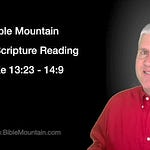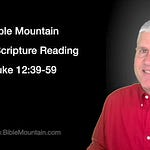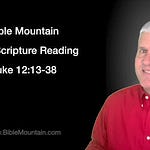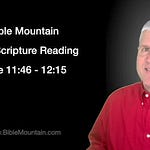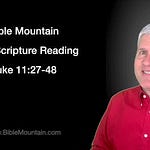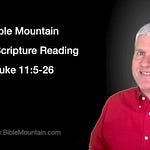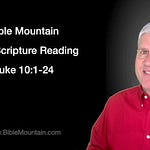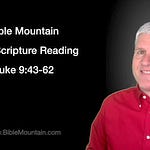Transcript:
The 16th chapter of Mark is a difficult passage to draw lessons from because there is uncertainty about the text itself. When the Bible was written, it was written and copied by hand because printing presses did not exist yet. Since it was humans who were doing the copying, mistakes were made. Fortunately, the mistakes were small and inconsequential. However, there are a couple passages where there is much uncertainty about what the author originally wrote. Mark 16 is one of those passage.
This is problematic because it is normal for humans to want knowledge to be black and white. We want to know exactly what is true and not true. We have questions and desire unambiguous answers to those questions. Christians naturally have a similar mindset regarding the Bible. We want certainty about what the Bible does and does not say.
Part of the reason we want no doubt about the text of scripture is because skeptics of Christianity use the doubts as weapons against scripture. They claim that since there is ambiguity about the text of certain passages, then we should be skeptical of the whole Bible.
That is not a reasonable argument. The Bible is a huge book. The exact wording of most passages is known with a high degree of certainty. The fact that a passage here and there is very questionable does not negate the strong confidence we can have regarding most of scripture.
Today’s passage is Mark 15:47 thru 16:20. Everything up to Mark 16:8 is strongly regarded as having been written by Mark. The rest of it is doubtful. However, we should not allow the doubt to dampen our opinion of scripture overall.
Jesus was hung on the cross in the third hour of the day. That would have been in the morning. At the sixth hour, around noon, darkness fell over the whole land. Then in the ninth hour, in the afternoon, Jesus cried out and breathed His last. The veil of the temple was torn in two from top to bottom.
There were several women watching from a distance: Mary Magdalene, Mary the mother of Joses, and Salome. They had followed and served Jesus in Galilee.
In the evening Joseph of Arimathea asked Pilate for the body. Pilate granted it to him. Joseph took it, wrapped it in a linen cloth and laid it in a rock tomb. Then he rolled a stone against the entrance of the tomb.
Mark 15:47 And Mary Magdalene and Mary the mother of Joses were looking on to see where He had been laid.
Mark 16:1 ¶ And when the Sabbath passed, Mary Magdalene, and Mary the mother of James, and Salome, bought spices, so that they might come and anoint Him.
Mark 16:2 And very early on the first day of the week, they came to the tomb when the sun had risen.
Mark 16:3 And they were saying to one another, “Who will roll away the stone for us from the entrance of the tomb?”
Mark 16:4 And looking up, they saw that the stone had been rolled away, although it was very large.
Mark 16:5 And entering the tomb, they saw a young man sitting on the right side, wearing a white robe; and they were amazed.
These women had followed Jesus in Galilee. They saw His miracles. After everything Jesus had done, you could argue the women should not have been amazed. Nothing should have surprised them at that point.
Mark 16:6 And he said to them, “Do not be amazed; you are looking for Jesus the Nazarene, who has been crucified. He has risen; He is not here; behold, the place where they laid Him.
Mark 16:7 But go, tell His disciples and Peter, ‘He is going ahead of you to Galilee; there you will see Him, just as He told you.’”
Mark 16:8 And they went out and fled from the tomb, for trembling and astonishment were gripping them; and they said nothing to anyone, for they were afraid.
The young man told them to tell the disciples of Jesus that Jesus was alive. However, they were so afraid they told no one.
The next verse starts the passage that is questionable. There are many doubts that the rest of this passage was actually written by Mark. It is okay to have doubts. The uncertainty should not damage our confidence in everything written up to this point.
Mark 16:9 ¶ [Now after He had risen early on the first day of the week, He first appeared to Mary Magdalene, from whom He had cast out seven demons.
Mark 16:10 She went and reported to those who had been with Him, while they were mourning and crying.
Mark 16:11 And when they heard that He was alive and had been seen by her, they refused to believe it.
We know from Mark 8:31 that when Jesus and His disciples were on the way to Caesarea Philippi, Jesus told His disciples that He would be killed and rise again the third day. Mark 9:31 tells us Jesus repeated this warning while they were walking through Galilee. According to Mark 10:34 Jesus said it a third time when they were on their way to Jerusalem.
When the disciples were told Jesus was alive, they should have believed it. They should have been expecting to learn He was alive. Even though there is doubt whether this passage is part of scripture, we know from Luke 24 that the disciples were skeptical of the resurrection. However, they should not have been doubtful.
Mark 16:12 ¶ After that, He appeared in a different form to two of them while they were walking along on their way to the countryside.
Mark 16:13 And they went away and reported it to the others, but they did not believe them either.
Mark 16:14 ¶ Afterward He appeared to the eleven themselves as they were reclining at the table; and He reproached them for their unbelief and hardness of heart, because they had not believed those who had seen Him after He had risen.
This verse tells us Jesus reproached the disciples for their unbelief and hardness of heart. We see variations of this in other gospels. Luke 24:25 tells us Jesus lightly criticized two men on the road to Emmaus. John 20:29 contains a soft rebuke of Thomas because he doubted.
Mark 16:15 And He said to them, “Go into all the world and preach the gospel to all creation.
Mark 16:16 He who has believed and has been baptized shall be saved; but he who has disbelieved shall be condemned.
This verse appears to say that we must be baptized by water in order to be saved. However, the word baptize was used in multiple ways throughout the New Testament. Mark 1:8 mentions baptism of the Holy Spirit. Mark 10:39 calls the death and burial of Jesus a baptism.
If this verse was actually written by Mark and is inspired scripture, which is doubtful, Mark may have meant that anyone who has believed and has been baptized by the Holy Spirit shall be saved. Mark may not have been referring to water baptism.
Mark 16:17 And these signs will accompany those who have believed: in My name they will cast out demons, they will speak with new tongues;
Mark 16:18 and they will pick up serpents, and if they drink any deadly poison, it will not hurt them; they will lay hands on the sick, and they will recover.”
Mark 16:19 ¶ So then, the Lord Jesus, after He had spoken to them, was taken up into heaven and sat down at the right hand of God.
Mark 16:20 And they went out and preached everywhere, while the Lord worked with them, and confirmed the word by the signs that followed.] ¶ [And they promptly reported all these instructions to Peter and his companions. And after that, Jesus Himself sent out through them from east to west the sacred and imperishable preaching of eternal salvation.]
The last part of verse 20 seems very odd and out of place. The manuscript evidence casts much doubt that this verse was actually written by Mark.
Humans naturally want knowledge to be black and white. We want to know exactly what is true and not true. Christians have a similar mindset regarding the Bible. We want certainty about what the Bible does and does not say.
The reality is the Bible was copied by hand by humans who make mistakes. While most of the Bible was copied and handed down to us very faithfully and accurately, there are a couple passages where we have a lot of uncertainty. Mark 16 is one of those passages.
Skeptics of Christianity use the doubts as weapons against scripture. They claim that since there is ambiguity about the text of certain passages, then we should be skeptical of the whole Bible. However, that is not a reasonable argument.
The Bible is a huge book. The exact wording of most passages is known with a high degree of certainty. The fact that a passage here and there is very questionable does not negate the strong confidence we can have regarding most of scripture.
Thanks for visiting Bible Mountain. If you have already joined my email list, thank you and please tell others about Bible Mountain. If you have not joined my email list yet, please do so now. In order to join, go to Bible Mountain dotcom, click on subscribe, and that will take you to a page where you can sign up. Your email address will not be sold nor given away. Once again, thanks for visiting Bible Mountain.
“Scripture quotations taken from the (LSB®) Legacy Standard Bible®, Copyright © 2021 by The Lockman Foundation. Used by permission. All rights reserved. Managed in partnership with Three Sixteen Publishing Inc. LSBible.org and 316publishing.com.”

